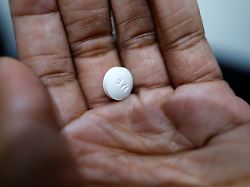Mifepristone commonly used
US court wants to make access to abortion pills more difficult
8/17/2023 3:33 am
In socio-political terms, there is probably no topic as controversial in the USA as the right to an abortion. After the Supreme Court overturned a landmark ruling and several states imposed restrictions and bans, opponents are targeting a specific drug.
A US federal appeals court has voted to restrict the use of the abortion pill. The court in the state of Louisiana said on Wednesday that the FDA approved the abortion pill mifepristone in 2000. The judges, however, agreed with a first-instance ruling that declared relaxations in the use of the pill decided by the FDA in 2016 to be illegal.
As a result, the use of mifepristone would only be possible up to the seventh and no longer up to the tenth week of pregnancy. In addition, the pill, which is used in more than every second abortion in the USA, could only be prescribed by doctors and not by other health workers and could no longer be sent by mail.
However, Wednesday’s judgment will not initially come into force: the US Supreme Court ruled in April that the pill would remain accessible under the previously applicable rules until the legal disputes were concluded. Appeals against Wednesday’s decision are likely to be filed very quickly.
Lawyers for the plaintiffs from the anti-abortion camp were pleased: The court had committed the FDA to its task of protecting women and girls and “ending the illegal mail order sale of abortions,” said lawyer Erin Hawley. Anti-abortion advocates argue that the FDA improperly approved mifepristone in 2000 and failed to adequately address the drug’s safety in underage abortion. The FDA has stated that mifepristone has proven safe and effective throughout its decades of use.
More than half of abortions are medical
A Texas federal judge appointed by Republican ex-President Donald Trump in April overturned the FDA’s approval of mifepristone after a lawsuit by anti-abortion advocates. The competent federal appeals court in New Orleans, Louisiana, overturned this decision, but allowed the conditions under which the pill may be prescribed to be tightened. The US government then went to the Supreme Court in Washington, which maintained access to mifepristone until further notice.
Abortion rights are one of the most controversial socio-political issues in the United States. In June 2022, the conservative-dominated Supreme Court abolished the nationwide fundamental right to abortion, causing a political earthquake. As a result, numerous states restricted access to abortions or banned abortions. But that’s not enough for opponents of abortion. They now want to ensure that the abortion pill mifepristone is taken off the market nationwide – including in those states where abortions are still allowed.
Mifepristone is used in 53 percent of abortions in the United States in combination with the drug misoprostol. According to the FDA, more than 5.6 million women have used the pill since it was approved in 2000. In less than 1,500 cases there were complications without a link to mifepristone being established.
Medical associations have criticized in court submissions that a ban on mifepristone would force patients to undergo surgical procedures. The pharmaceutical industry has warned that court repeals of drug approvals would undermine the FDA’s authority. In Germany, the active ingredient mifepristone is sold under the name Mifegyne.
